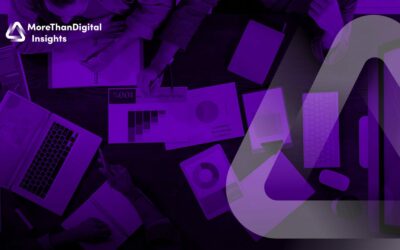Data-driven consulting has become a powerful tool for companies to gain insights into customer behavior, market trends, and operational efficiencies. By harnessing the power of data analytics and evaluation, companies can make more informed decisions that lead to better outcomes.
This article will explore twelve examples and use cases for data-driven consulting across various industries. We will examine how companies use Big Data to drive their business and unlock new opportunities. Through these real-world examples, we can see how data is transforming the way businesses operate today.
1. Marketing and Sales Optimization
One of the most common use cases of data-driven consulting is optimizing marketing and sales strategies and sales funnel. By analyzing customer behavior data, open rates, purchase histories, and more, consultants can help businesses identify critical trends and patterns, such as which channels drive the most traffic and which products are most popular among specific customer segments.
Typical tasks for consultants:
- Develop personalized marketing campaigns
- Data-driven marketing campaigns and outreach
- Identify new markets and customer segments,
- Strategies for reaching existing and new audiences.
2. Strategic Business Decisions
Data-driven consulting can help businesses make more informed and strategic decisions. With access to data and foresight, consultants can advise companies on the best course of action for their business. This could involve selecting the most relevant data for a particular project or forecasting future trends to anticipate changes in customer behavior or market conditions. By providing insights into customer preferences, competitors’ activities, industry developments, and more, consultants can provide invaluable guidance when making strategic business decisions.
Typical tasks for consultants:
- Conducting market research and analysis
- Using tools and benchmarks (e.g., MoreThanDigital Insights)
- Developing predictive models
- Identifying high-impact areas of focus for a business
3. Data Visualization and Dashboards
Data-driven consultants can help businesses understand their data better by developing custom data dashboards that provide meaningful visuals of critical metrics. Data visualization can help organizations better understand trends and identify areas for improvement. Custom dashboards can also monitor performance over time, quickly identify patterns and outliers, compare data from different sources, and generally make sense of large amounts of data.
Typical tasks for consultants:
- Develop interactive dashboards
- Creating benchmark data sets (e.g., MoreThanDigital Insights).
- Integrating data visualization tools (e.g., Tableau) with existing analytics solutions
- Training employees on how to use the dashboard effectively
4. Product development
Data-driven consulting can also be used to develop better products or services. By analyzing customer feedback, usage metrics, and other relevant information, consultants can provide actionable insights into what customers want and need to make more informed product decisions. They can also help companies identify opportunities for improvement and suggest strategies to increase customer loyalty and satisfaction.
Typical tasks for consultants:
- Identifying opportunities for improvement in existing products/services.
- Developing new features and services that are aligned with customer needs
- Analyzing customer feedback as a basis for UX design
- Tracking usage metrics to monitor performance over time.
5. Customer Segmentation
Customer segmentation is another crucial use case connected to sales and marketing and an excellent example of data-driven decisions. Large datasets allow insights into customers by segmenting them based on essential characteristics such as demographics, purchasing behavior, preferences, etc.
Typical tasks for consultants:
- Create data-driven customer personas (many, not just 5-10)
- Hyper-Personalization with huge datasets
- Custom marketing targeting for each segment
- Create marketing channel automation with personalization
- Create dashboards and predictive models
6. Supply Chain Optimization
By analyzing supply chain data, consultants can help businesses identify inefficiencies and bottlenecks and develop strategies for streamlining operations. For example, a consultant might use data to determine which suppliers provide the most reliable service and develop strategies for reducing lead times and improving inventory management. Using large data sets can lead to fewer costs, no outages, less inventory, and a better customer experience.
Typical tasks for consultants:
- Benchmarking of supplier performance
- Analysis of ordering and delivery systems
- Strategies to improve operational efficiency in the supply chain
- Identification of bottlenecks and opportunities to optimize operations.
- Predictive analytics & forecasting models
7. Fraud Detection
To prevent fraud, analyzing transaction data and other relevant data sources, consultants can help businesses identify potential fraud and develop strategies for mitigating risks. Often consultants investigate fraudulent activity by tracing patterns in past incidents and identifying those, and building models to detect these activities before real damage is caused.
Typical tasks for consultants:
- Investigating previous incidents of fraud
- Setting up systems to see fraudulent activities
- Developing models to predict potential fraud
- Creating dashboards and visualization tools for tracking patterns in data.
8. Risk Management
Risk management is another everyday use case for data-driven consulting. By analyzing risk data, similar to fraud detection, and developing risk models, consultants can help businesses identify potential risks and develop strategies for mitigating them. For example, a consultant might use data to identify emerging market trends or regulatory changes and develop strategies for addressing these risks.
Typical tasks for consultants:
- Develop risk models to identify potential risks
- Analyzing data sources to understand emerging market trends or regulatory changes
- Develop risk mitigation and mitigation strategies.
- Designing dashboards and visualization tools to track risk metrics over time.
9. Employee Engagement and Retention
Data-driven consulting can be used to analyze employee engagement data to identify trends, patterns, and areas for improvement. Consultants can help businesses create employee engagement surveys, develop strategies for improving engagement, and identify the factors influencing employee retention.
Typical tasks for consultants:
- Creating employee engagement surveys and analyzing the results
- Developing strategies for improving employee engagement and retention
- Identifying the factors that influence employee engagement and retention
10. Social Media Analytics
Data-driven consulting can also be used to analyze social media data to identify trends and patterns, understand customer sentiment, and develop strategies for social media marketing. Consultants can help businesses track social media mentions and engagements, analyze customer feedback on social media platforms, and create content strategies that resonate with target audiences.
Typical tasks for consultants:
- Analyzing social media data to identify trends and patterns
- Tracking social media mentions and engagements
- Developing content strategies for social media marketing
11. Healthcare Analytics
Data-driven consulting can be used in the healthcare industry to analyze patient data, identify trends and patterns, and develop strategies for improving patient outcomes. Consultants can help healthcare providers improve patient satisfaction, reduce costs, and optimize operations by analyzing patient data and developing predictive models.
Typical tasks for consultants:
- Analyzing patient data to identify trends and patterns
- Developing predictive models to improve patient outcomes
- Optimizing healthcare operations to reduce costs and improve patient satisfaction
12. Environmental Analytics
Data-driven consultants can analyze environmental data, identify trends and patterns, and develop strategies for improving environmental sustainability. Consultants can help businesses reduce their ecological footprint, create green products and services, and comply with environmental regulations by analyzing ecological data and developing sustainability strategies.
Typical tasks for consultants:
- Analyzing environmental data to identify trends and patterns
- Developing strategies for improving environmental sustainability
- Complying with environmental regulations and reducing the ecological footprint
Future of Data-Driven Consulting
As companies seek to harness the potential of data to make informed decisions, the importance of data-driven advice is only likely to increase. In addition, new technologies such as AI and ML pave the way for advisors to analyze information faster and more accurately than ever before. It is, therefore, clear that these advances will dramatically impact the future of data-driven advisory services.
Despite its advantages, data-driven consulting has some hurdles to overcome. Protecting private information and balancing tangible results with human analysis are just some of the problems that must be addressed. As a result, advisors specializing in data-driven solutions must have the versatility to navigate the complicated world of analytics while maintaining ethical standards to earn their clients’ trust.






